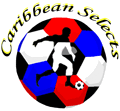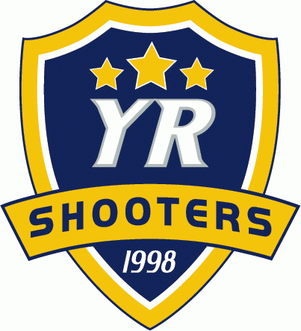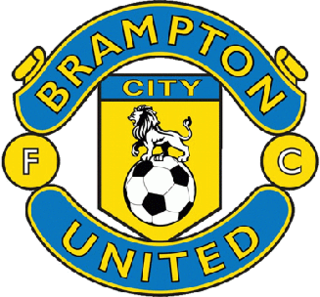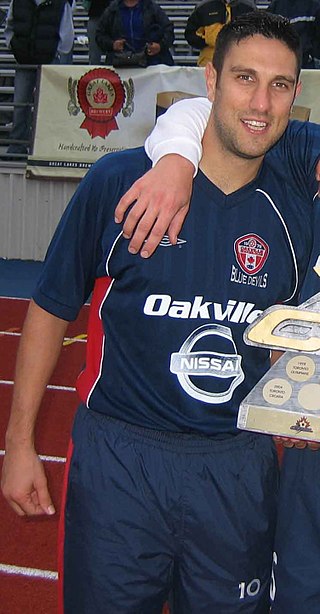The Open Canada Cup was an annual knock-out cup competition in Canadian Soccer. The competition was first held during the 1998 season as the CPSL League Cup. It was organized by the Canadian Soccer League originally as a League Cup for CSL member clubs. After operating the competition for several seasons as an exclusive tournament, the league's ownership decided in 2003 to grant accessibility to all Canadian professional and amateur clubs. The decision was influenced by the lack of initiative by the Canadian Soccer Association in providing a potential candidate for the CONCACAF Champions' Cup.

C.N.S.C. Toronto Croatia is a Canadian soccer team based in Toronto, Ontario, that plays in the Supergroup Open Division in the Canadian Academy of Football. The team's colours are red, white and blue, similar to those of the Croatia national team.

Serbian White Eagles Football Club is a Canadian semi-professional soccer team. The team is a member of the Canadian Soccer League, a non-FIFA sanctioned league.

London City Soccer Club is a Canadian soccer team founded in 1973. The team is currently a member of the Canadian Academy of Soccer League. The team plays their home games at the Milton Community Sports Park in the town of Milton, Ontario. The team's colours are red, black and white. Formed on Valentine's Day of 1973 by Markus Gauss in order to field a London entry for the National Soccer League after the departure of German Canadian FC. The Gauss family ran and provided the city of London a professional team for 38 years. Under their tutelage the club was most notable for providing an opportunity for young players to develop in a professional environment.

Caribbean Stars Soccer Club was a professional soccer club in the Greater Toronto Arena, Canada, which evolved to a news and sports website.

The North York Astros were a Canadian soccer team that was founded in 1990. The team initially played in the National Soccer League. The team played their home games at Esther Shiner Stadium in North York, a district of the city of Toronto, Canada. The team's colours were orange and black. The club was originally named North York Atletico Argentina Soccer Club, and witnessed instant success in its initial stages. After a merger with North York Talons, and a relocation to Scarborough the team was eventually renamed the North York Astros. The Astros were a founding member of the Canadian National Soccer League's successor league the Canadian Professional Soccer League in 1998.

St. Catharines Roma Wolves, are a Canadian soccer team, founded in 1967. The team currently plays in the semi-professional League1 Ontario in both the men's and women's divisions. The club is a former member of the Canadian Soccer League (CSL), where it fielded a professional team from 1998 to 2013, and now operates youth teams in the Peninsula Soccer League. Teams play out of Club Roma in St. Catharines, Ontario in the Niagara Peninsula. The team's colours are dark red and white, mimicking those of the famous Italian club A.S. Roma.

York Region Shooters is a Canadian soccer team, that plays in the Canadian Soccer League. The Shooters played their home games at the St. Joan of Arc Turf Field in the City of Vaughan, Ontario. The team's colours were blue and white, mirroring those of the Italy national team and reflecting the cultural heritage of the club. The club had also competed under various different names as Vaughan Sun Devils, Vaughan Shooters, Italia Shooters, and finally as York Region Shooters.
The 2006 Canadian Soccer League season was the 9th season for the Canadian Soccer League. The season began on May 19, 2006, and concluded on October 15, 2006, with Italia Shooters defeating Serbian White Eagles, 1–0, at Esther Shiner Stadium to win their first CSL Championship. In the regular season Serbia clinched the International Division, and Oakville Blue Devils secured their first National Division title. The league was re-branded as the Canadian Soccer League, and renamed their two existing conferences into the International and National division. The changes brought about an increase in sponsorship, media coverage, and a 50% increase in attendance. The CSL also received greater autonomy from the Ontario Soccer Association. The league struck an agreement with the Toronto Community News which provided coverage for the league and its member clubs through their nine community newspapers.
The 2004 Canadian Professional Soccer League season was the seventh season for the Canadian Professional Soccer League. The season began on May 24, 2004 and concluded on October 11, 2004 with Toronto Croatia defeating Vaughan Shooters 4–0 to capture their second CPSL Championship. The championship was hosted for the first time at Victoria Park Stadium in Brampton, Ontario, which granted the Brampton Hitmen a wildcard berth. In the regular season the Toronto Supra clinched their first Eastern Conference title, while Hamilton Thunder secured their second Western Conference title. Though the league decreased in membership they managed to expand to the Windsor - Detroit territory with the addition of the Windsor Border Stars.
The 2000 Canadian Professional Soccer League season was the third season under the Canadian Professional Soccer League name. The season began on May 26, 2000 and concluded on October 1, 2000 with Toronto Croatia defeating Toronto Olympians 2-1 to claim their first CPSL Championship. The final was hosted at Cove Road Stadium for the first time. Throughout the season, all eight clubs from the previous year returned, while the Olympians secured their third straight regular season title. The league received sponsorship from Primus Canada, which granted Primus naming rights to the CPSL Championship, and Vincent Ursini was appointed the CPSL Chairman.
The 1999 Canadian Professional Soccer League season was the second season under the Canadian Professional Soccer League name. The season began on May 28, 1999, and concluded on October 2, 1999, with Toronto Olympians defeating Toronto Croatia 2-0 to claim their first CPSL Championship. The Olympians made history by becoming the first club in the league's history to achieve a treble. For the second straight season, they went undefeated for the entire season. The league also introduced their first All-Star match where the CPSL All-Stars faced the CSA Development team.
The 1998Canadian Professional Soccer League season was the inaugural season under the Canadian Professional Soccer League name. The season began on May 31, 1998, and concluded on October 14, 1998, with the St. Catharines Wolves defeating the Toronto Olympians in 4-2 victory in a penalty shootout to claim the first CPSL Championship held at Centennial Park Stadium in Toronto, Ontario. Though Toronto was denied the treble they still managed to go undefeated the entire regular season, and dominate the league with the best offensive and defensive record.

Brampton City United FC is a Canadian soccer team, founded in 2002. The team plays in the Lika Supergroup Open Division. The club plays out of Victoria Park Stadium in the community of Brampton, Ontario.
The 2013 Canadian Soccer League season was the 16th since its establishment where a total of 21 teams from Ontario took part in the league. The season began on May 3, 2013, and concluded on November 3, 2013. SC Waterloo captured their first championship in a 3–1 victory over regular season champions Kingston FC in the CSL Championship final at Kalar Sports Park in Niagara Falls, Ontario. Waterloo became the first club to win both the First and Second Division championships in one season. While Toronto Croatia B won the second division regular season title.
The 2014 Canadian Soccer League season was the 17th since its establishment where a total of 20 teams from Ontario took part in the league. The season began on May 24, 2014, and concluded on October 26, 2014. York Region Shooters won their second championship in a 5–4 victory in a penalty shootout over Toronto Croatia in the CSL Championship final held at Esther Shiner Stadium in Toronto. York Region became the second club in the league's history to produce a perfect season, and championship after the Toronto Olympians in the 1999 season.

Phil Ionadi is a Canadian businessman, soccer executive, former soccer player, head coach, and the general manager for the Canadian Arena Soccer Association.

Rafael Carbajal is a Uruguayan former footballer and current manager for Club Atlético 3 de Febrero.
The Canadian Soccer League Awards is an annual awards ceremony for several individual performances at the end of the season. The event was established in 1998, when the Canadian National Soccer League merged with the stillborn Ontario Professional Soccer League to form the Canadian Professional Soccer League. The ceremony has been traditionally held at awards banquet at the end of the season with the exception in 2008, 2009, and 2010 where they were given out before the CSL Championship final. In 2010, the league began distributing awards to the Second Division for the first time.

Vincent Ursini is a Canadian accountant, former soccer executive, and stage actor.











